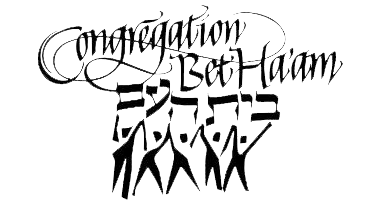By Rabbi Jared H. Saks
Friends, as I’m writing this it is the eighth day of protests across our country following the murder of George Floyd by a Minneapolis police officer while his colleagues stood idly by. By my count, today is also the seventy-seventh day since we closed our synagogue building to the public in response to the COVID-19 crisis. I have no idea what the world will look like when this piece is published. While I can remain hopeful that the world will be in even a slightly better place by the time you’re reading this, I am not naïve. In all likelihood, coronavirus will continue to plague the world, racial injustice will continue to run rampant, and those protesting to dismantle systemic racism may still be facing terror from the highest office in the land. These are terrible times. Still, I am not without hope. I still believe that we have within us the power and capability to bring to fruition the vision of a perfect world to which our tradition ascribes.
Our people has always been one of protest. Abraham protested God’s plan to destroy Sodom and Gomorrah. Mahlah, Noa, Hoglah, Milcah, and Tirza—the five daughters of Zelophehad—brought their protest of unjust inheritance laws to Moses, to which God responded in their favor. Isaiah, Jeremiah, and other prophets repeatedly challenged their people and the Jewish leadership to aspire to God’s ethical ideals and engage in moral revival. Speaking truth to power is in our collective DNA and we have a moral and religious obligation to be a light to the nations.
We also know that we are not perfect. In the examples above, only Abraham’s concern addresses people who are not Jewish. In the midst of racial injustice that goes unabated and a global pandemic—mismanaged on our shores and disproportionately affecting people of color, the poor, and the most vulnerable—we have to be willing to take a step back and consider not only our responsibility to speak out, but also our culpability in these calamities of our time.
In a few weeks, we’ll commemorate the holiday of Tisha b’Av. Tisha b’Av (the ninth day of the Hebrew month of Av) is a national day of mourning in the Jewish calendar. It is one of six regular fast days in the Jewish year. Tisha b’Av and only one other of these, Yom Kippur, involves a full, twenty-four-hour fast. The others are considered minor fast days, requiring fasting only from sunrise to sundown. Except for Yom Kippur, all of these days were established in response to catastrophes or sufferings that occurred on their dates in our history. “Their purpose is to help us recall the negative behavior of our ancestors that led to those calamities, and to focus our attention on our own parallel behavior that continues to drive our nation into similar negative situations.”[1]
Fasting is a powerful spiritual practice. For those of you who have engaged in a full fast on Yom Kippur, or even attempted it, you know both how challenging and rewarding it can be. In addition to refraining from food and drink (except in instances where one’s health requires eating or drinking), the other customs of Tisha b’Av include refraining from washing or bathing, refraining from wearing cosmetics and leather, and abstaining from sexual relations. The only study permitted on Tisha b’Av is distressing texts, such as the books of Lamentations and Job, as well as portions of Jeremiah and the Talmud that address mourning or the destruction of Jerusalem.
Some of you know that I have a challenging relationship with Tisha b’Av. As a Reform Jew, I have a hard time connecting with its longing for the rebuilding of the Temple in Jerusalem. I neither desire a return to the sacrificial system nor do I believe that Judaism requires a central shrine. I do not mourn the loss of that building. But I do mourn the loss of life that occurred in conjunction with Jerusalem’s destruction. I do mourn the loss of human decency that allowed the Babylonian and Roman empires to cart our people off into slavery. I feel those losses today, which is why for the first time since I can remember, I will be fasting on Tisha b’Av.
I hope that you’ll consider joining me not only in fasting, but also by engaging with difficult texts. Consider books on racial justice such as White Fragility by Robin DiAngelo, How to Be an Antiracist by Ibram X. Kendi, and The New Jim Crow by Michelle Alexander. Listen to the music of racial justice, such as Billie Holiday’s recording of Strange Fruit, Miguel’s How Many, and Ellisha and Steven Flagg’s I Can’t Breathe. Ellisha and Steven Flagg are the siblings of Eric Garner, who also died at the hands of police while uttering “I can’t breathe.”
Tisha b’Av starts at sundown on Wednesday, July 29 and lasts until sundown on Wednesday, July 30.
[1] https://www.aish.com/atr/What_is_the_Purpose_of_Fasting.html
Photo by James Eades on Unsplash

